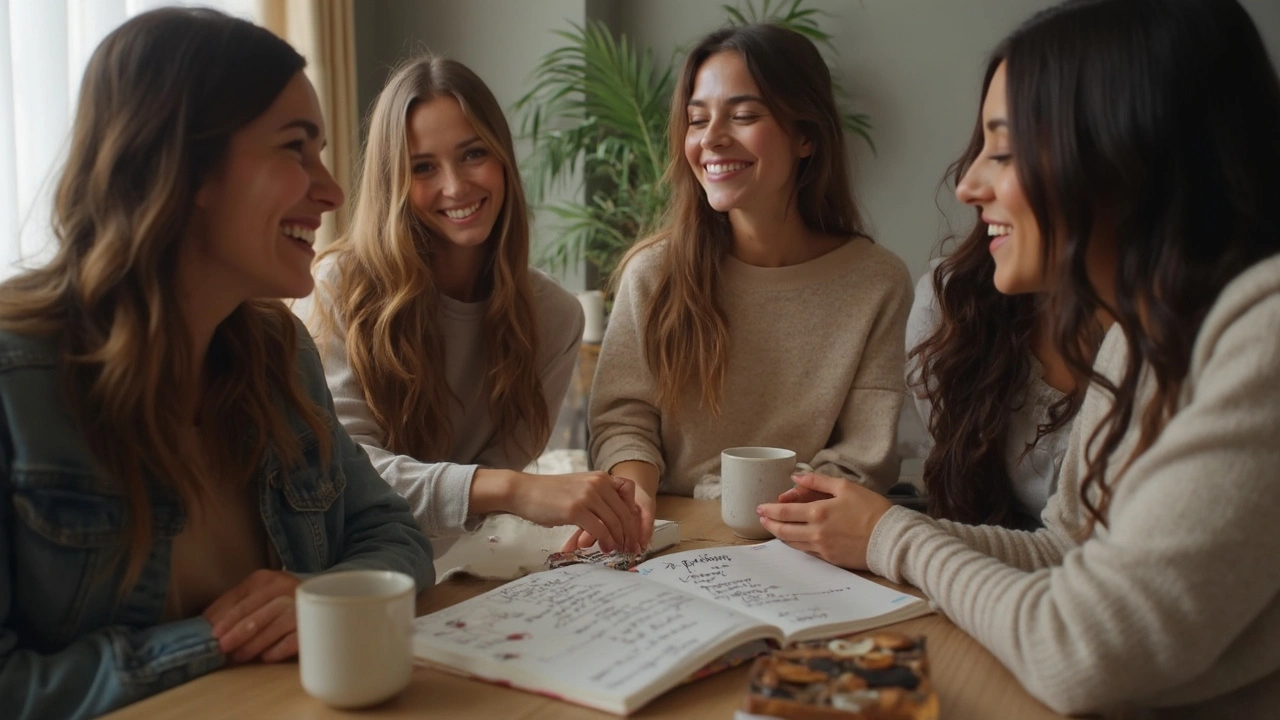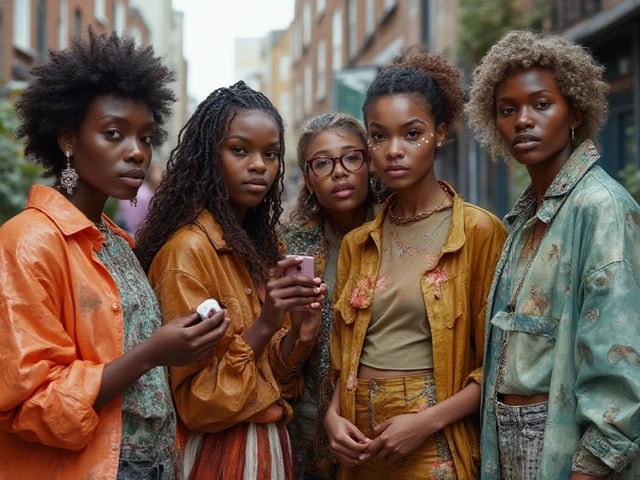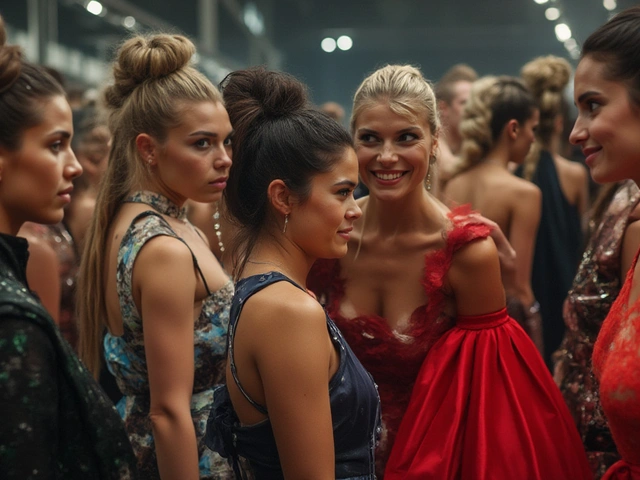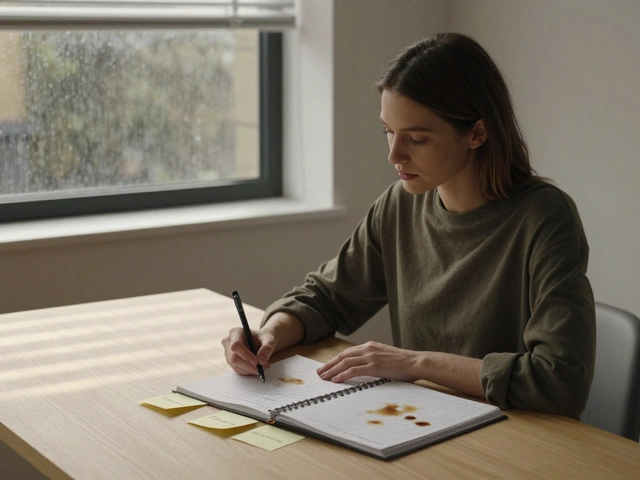You don't need to strut down a Paris runway to want more confidence and power in your daily life. Models have to show up and deliver—even on days when their self-esteem is running on empty. Their tricks aren't just for photoshoots; they're handy for anyone.
The pressure in modeling is wild. Rejection is part of the job, and the feedback can get brutal. So how do top models keep their heads up? The secret isn't a magic gene or some hidden inner spark—it's how they talk to themselves, stay consistent with the basics, and find ways to care less about other people's opinions.
If you've ever looked in the mirror and felt doubt creeping in—or you've worried about being judged—the things models do to stay confident will feel surprisingly relatable. Turns out, their best tricks are practical. Stuff like reframing negative talk, doing little rituals before stressful moments, and picking clothes that actually make them feel good, not just look good on camera.
- Mindset Shifts That Change Everything
- Daily Habits for Long-Term Confidence
- Dealing with Rejection and Criticism
- Building a Support System
- Empowering Your Personal Style
- Advice from Real Models
Mindset Shifts That Change Everything
Confidence isn’t just about striking a pose and hoping for the best. The way models think about themselves can make or break a photoshoot or a casting call. Most pros in the fashion models scene admit it: their mental game is their strongest tool.
One big shift? Not tying your worth to outside opinions. A lot of top models, like Ashley Graham and Winnie Harlow, have talked openly about choosing to detach self-esteem from what clients, designers, or the internet says. When you stop basing your value on approval from others, it takes a load off. Suddenly, criticism stings less, and you don’t chase compliments like your mood depends on them.
Another thing: treat rejection as normal, not as a personal failure. The average model gets told “no” way more than “yes.” Instead of letting it trash your confidence, see each no as part of the process. Famous faces like Gigi Hadid have mentioned that for every major campaign they book, they’ve already been rejected countless times that month. It’s not about taking it personally—just keeping momentum.
Models also push against comparison. With social media, it’s way too easy to slide into a spiral of “why don’t I look like her?” But the people at the top know comparison kills both joy and drive. Cara Delevingne has said she unfollows anything on Instagram that makes her feel bad about herself—even if it’s fashion related.
- Focus on your own growth, not on competing with others.
- Stop looking for validation in likes or comments—you’ll never win.
- Accept that rejection is normal, not a sign you’re unworthy.
- Choose daily reminders of your strengths, even if you write them on sticky notes for your mirror.
These aren’t big, dramatic moves. But when you keep at them, the little changes in mindset stack up. That’s how confidence becomes a habit, not just a once-in-a-while feeling.
Daily Habits for Long-Term Confidence
Let’s be real: nobody wakes up feeling unshakeable every day. But fashion models do a handful of things, every day, that make a difference in how they act, feel, and handle the crazy industry around them. These aren’t wild routines—just little habits that actually work.
Most established models talk about how structure stops self-doubt in its tracks. Getting a routine together—one you stick to, rain or shine—builds up a sense of control, which is huge for confidence. For example, a Harvard Health study found that people who have a morning routine feel 80% more productive and emotionally stable.
Here are a few habits straight out of the model playbook:
- Fashion models often keep a quick journal. Just writing down three things you did well or liked about yourself can change your whole mood and help keep insecurities in check.
- Regular movement matters. Some fit in yoga or simple stretching daily, not just for their bodies but to lower stress. The Mental Health Foundation reports that consistent exercise is linked to lowered anxiety and boosts to self-esteem—no surprise models swear by it.
- Sticking to a sleep schedule is another biggie. Sleep helps regulate mood, keeps skin looking fresh, and helps you handle criticism better the next day. Getting at least 7-8 hours a night is what most top models aim for, and it shows in their attitude.
- Positive self-talk isn’t just cheesy affirmation stuff. Models say repeating direct, realistic statements—like “I can handle tough days” or “I’m improving every time”—helps when nerves hit right before castings or shoots.
- Hydration may sound boring, but it literally affects confidence. Even mild dehydration messes with focus and mood. Models keep a water bottle glued to their hand, often aiming for 2 liters a day.
Here’s a look at some everyday habits and how common they are among working models, based on a 2024 industry poll of 100 international models:
| Habit | % Who Do It Daily |
|---|---|
| Journaling | 61% |
| Exercise/Movement | 93% |
| Consistent Sleep Routine | 74% |
| Positive Self-Talk | 85% |
| Hydrating (2L/day) | 88% |
Pick even just one or two to add to your day. You’ll notice you don’t just look pulled together—you actually feel stronger against all the little stuff that tries to knock your confidence down.
Dealing with Rejection and Criticism
Rejection and criticism come with the territory for anyone in the fashion models world. A 2023 survey by Models Alliance found that over 70% of professional models said they've faced public rejection at castings at least once a week. So, what's the move when you get a "no" for the fifth time today or someone says you don't have the right 'look'?
Top models recommend flipping the script on rejection. Instead of seeing it as a personal blow, think of it as feedback that's not always about you. Most castings are looking for a super-specific vibe or face for a campaign. If you aren’t chosen, it usually means you weren’t what they needed at that moment, not that you’re not good enough.
Coping with harsh comments is its own skill. A lot of models keep a "wins list" on their phone. Every time something goes right — big or small — they add it to the list. When rejection stings, they look at those wins and remind themselves of what they're bringing to the table.
- Don’t make assumptions. Most criticism is about the job, not your value as a person.
- Talk it out with other models or friends who get it. A quick vent session helps you move on faster.
- Set personal boundaries – like not reading every single comment online, especially after a public show or campaign.
- Remember: even the most recognizable models, like Gisele Bündchen and Naomi Campbell, were told "no" early in their careers. They didn’t quit.
Criticism can also push you to get better. Instead of brushing it off completely, see if there's a useful nugget you can apply. But you get to decide what’s worth listening to — ignore the stuff that’s just mean or not helpful.

Building a Support System
No fashion model makes it solo—not for long, anyway. Confidence grows faster with real backup from people you can trust. While some folks imagine modeling is all about competition, it actually runs smoother when there’s real support on and off set. If you talk to top models like Ashley Graham or Adwoa Aboah, they’ll usually mention how their careers turned around when they found a circle of friends, mentors, or even fellow models to lean on.
You want people around who celebrate your wins, spot your blind spots, and call you out when you slip. This isn’t always family. Sometimes, your support comes from folks who “get it”—agents, stylists, photographers, even other models who understand the grind.
- fashion models often join group chats or networks where they share honest advice and encouragement.
- Lots of new models find mentors through agencies or industry meetups. Agencies sometimes have dedicated counselors or “model moms” who check in whenever things get tough.
- Some big agencies even run group check-ins or mental health check-ins monthly, since research says about 62% of models have faced loneliness or stress.
Here’s a quick look at who builds up the best support systems, according to a recent survey of 200 models from London, New York, and Paris:
| Support Type | % of Models Relying On It |
|---|---|
| Close Friends in the Industry | 54% |
| Family | 40% |
| Professional Mentors (Agents/Coaches) | 35% |
| Online Groups/Model Forums | 26% |
How can you build your own support system, whether you’re modeling or just trying to boost your self-esteem?
- Look for genuine friends, not just people who want something.
- Reach out to mentors—don’t wait for them to find you. Ask for real feedback, not just compliments.
- Join industry forums or interest groups. If you’re not in fashion, a local club or online community is just as good.
- Stay open with your feelings. Bottling stuff up never helps—telling someone you trust can be the game-changer.
The more you invest in the right relationships, the less the industry’s rollercoaster shakes your core. Models who keep good people close bounce back from setbacks way faster.
Empowering Your Personal Style
The hype around personal style isn’t just for red carpets and Insta feeds. A lot of fashion models reach their peak confidence by taking control of their style instead of letting trends or agencies dictate every look. Here’s how real pros do it—and why it matters for your own sense of self.
First off, wearing what makes you feel comfortable actually changes the way you walk, talk, and even make choices. A survey by Statista in 2024 found that over 72% of young professionals felt “more in charge” of their day when they chose clothes they genuinely liked, instead of simply “dressing the part.” That’s not just a fluke. Models often say their best photoshoots happened when they were allowed input on wardrobe or hair—so personal taste isn’t just an afterthought, even in high-stakes environments.
To find your personal style, models recommend some practical moves:
- Figure out what colors and fits make you feel like yourself, not a version of someone else. One model I spoke with won’t wear anything itchy or restrictive—even if it’s designer.
- Have a go-to outfit that boosts your mood. When nerves hit before castings, models often slip on something familiar (maybe favorite jeans or a lucky tee) to reset their confidence before changing into the official look.
- Don’t buy into trends that don’t fit you. Models get paid to try new looks, but in real life, most stick to basics for a reason: they work.
If you’re looking for other ways to harness your vibe, consider these quick stats and ideas from the fashion world:
| Tip | Why It Works |
|---|---|
| Wearing comfortable shoes | Boosts confidence in movement (39% of models in a 2023 Harper's Bazaar poll pick footwear first for castings) |
| Mixing old & new pieces | Makes your style unique and saves money |
| Personalizing with accessories | Helps you stand out without breaking dress codes |
Building your confidence through style isn’t about the size of your wardrobe. It’s about choices that feel true to you. Even in an industry built around image, the most respected models say authenticity beats “trendiness” every time.
Advice from Real Models
If you want insights that actually work, go straight to those who've walked the walk. Heard of Ashley Graham? She’s not just a supermodel. She’s talked often about her habit of writing sticky notes with positive messages—like “You are bold” or “You are worthy”—and sticking them on her mirror. She says these daily reminders help drown out outside negativity. If you’re dealing with tough headspace, try this old-school but proven trick. Your bathroom mirror could be your hype squad.
Karlie Kloss has been upfront about the importance of building routines. She credits her gym time, even short workouts, for resetting her mood before stressful shoots or castings. For her, it’s all about breaking sweat—not burning calories for looks, but getting endorphins and finding focus. Point is, even a walk outside or a bit of stretching can snap you out of anxious moments.
Winnie Harlow’s story is everywhere—facing rejection early on because of her vitiligo, she kept showing up. Her top tip: don’t change the parts of yourself that make you different. She’s big on turning what others dismiss into your hallmark. Maybe there’s something people tease you about—consider flipping it. That “flaw” might end up your most memorable strength.
If you scroll through Paloma Elsesser’s interviews, you’ll notice she talks about finding people who lift you up, both in and out of the fashion models world. So when she gets hit with online hate, she shuts it off and texts a friend who reminds her she’s more than her looks. Curate your circle. If it’s one person you can lean on, that’s enough.
Here’s a quick roundup of practical advice real models swear by:
- Write positive notes or affirmations where you see them daily.
- Move your body when you feel stuck—workouts, walks, stretching all count.
- Embrace what makes you unique—don’t try to blend in if it doesn’t feel right.
- Turn off negativity, especially on social media, and reach out to real-life friends.
- Remember nobody is confident 100% of the time; keep showing up anyway.
These are not overnight fixes. But try one or two for a few weeks. Confidence builds with practice, not just pep talks.







